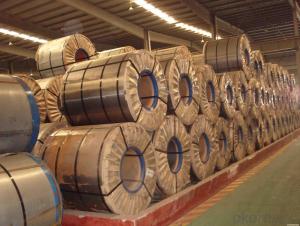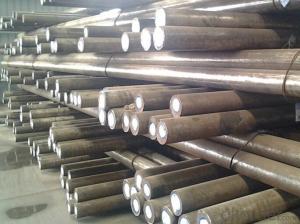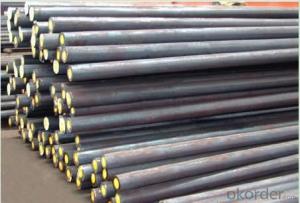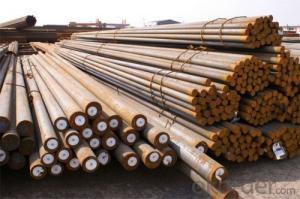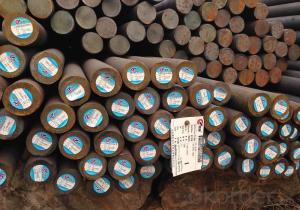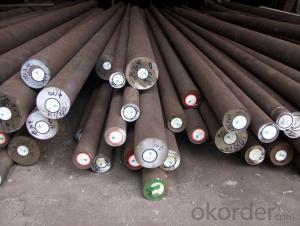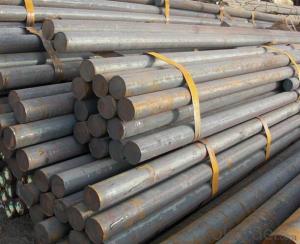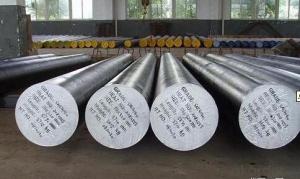DIN1.7225 Alloy Structural Steel Rod 4140 Special Steel
- Loading Port:
- China main port
- Payment Terms:
- TT OR LC
- Min Order Qty:
- 25 m.t.
- Supply Capability:
- 10000 m.t./month
OKorder Service Pledge
OKorder Financial Service
You Might Also Like
Specification
The details of our Steel
1. Produce Standard: as the GB, AISI, ASTM, SAE, EN, BS, DIN, JIS Industry Standard
2. Produce processes: Smelt Iron -EAF smelt Billet - ESR smelt Billet -Hot rolled or forged get the steel round bar and plate
3. Heat treatment:
Normalized / Annealed / Quenched+Tempered
4. Quality assurance:
All order we can received Third party inspection, You can let SGS, BV,.. and others test company test and inspect our products before Goods shipping.
Product information
Chemical Composition(%) of 4140 round steel | C | Si | Mn | P | S | Cr | Mo |
0.38-0.45 | ≤0.40 | 0.60-0.90 | ≤0.035 | ≤0.035 | 0.90-1.20 | 0.15-0.30 | |
Specification of 4140 round steel | Hot Rolled: Dia.(mm)*L(mm)=14-200*2000-6000 | ||||||
Forged: Dia.(mm)*L(mm)=210-800*2000-6000 | |||||||
Application of 4140 round steel | (1) Commonly used for manufacturing 35CrMo higher than the required strength, large parts of the important sectional dimensions, such as axis, gear, connecting rod, transmission gears, the supercharger gear, engine cylinder, spring, spring clamps, 12-2000mm oil pipe fittings, fishing tools and instead of containing nickel steel high. (2) For main shaft of steamer,boly for 400 °C. Hummar shank. | ||||||
Characteristic of 4140 round steel | (1) Chromium molybdenum high tensile steel with yield strength of 550N/mm2. (2) Chromium renders steel oil hardenable and increase hardenability. (3) Weldability suffers with increasing chromium content. (4) High temperature strength and high pressure hydrogenation properties are promoted by chromium and molybdenum. (5) Molybdenum significantly reduces temper brittleness. | ||||||
Heat Treatment of 4140 round steel | Forging:1100~900°C Normalization:860~880°C Subcritical Annealing:680~720°C Isothermal Annealing:830~900 670x3h°C Hardening:830~860 oil Tempering:550~650°C | ||||||
Mechanical Properties of 4140 round steel | Tensile str. (N/mm2):1080 Yield point (N/mm2):930 Elongation (%):12 Contraction (%):45 Impack work (J/cm2):63 Hardness (HB):217 | ||||||
Delivery Condition of 4140 round steel | hot rolled, black surface, annealed | ||||||
Payment Term of 4140 round steel | L/C at sight,T/T,30% in advance,70% before the shipment | ||||||
Product show

Workshop show

- Q: What is the role of special steel in the oil and gas industry?
- Special steel plays a crucial role in the oil and gas industry as it is used for various applications that require high strength, corrosion resistance, and durability. It is extensively used in the construction of pipelines, offshore platforms, drilling equipment, and storage tanks. Special steel ensures the integrity and reliability of these critical components, enabling safe and efficient operations in the challenging and harsh environments of the oil and gas industry.
- Q: Can special steel be used in the energy sector?
- Indeed, the energy sector can utilize special steel. This term encompasses a range of high-performance alloys that are specifically crafted for applications necessitating exceptional strength, durability, and resistance to corrosion and extreme temperatures. These qualities render special steel an optimal choice for numerous components employed in the energy sector. Within the oil and gas industry, special steel is frequently employed in the construction of pipelines, drilling equipment, and offshore platforms. Its robustness and resistance to corrosion guarantee the integrity and reliability of these vital structures, even in challenging environments. Special steel is also extensively employed in power generation plants. For instance, in thermal power plants that generate steam for electricity production, special steel is employed in the production of boiler tubes and pressure vessels. The extraordinary heat resistance and structural integrity of special steel ensure the secure and efficient operation of these components, even under high temperatures and pressure. Moreover, special steel finds applications in the renewable energy sectors, such as wind and solar power. In the case of wind turbines, special steel is utilized in the manufacturing of rotor shafts, gears, and bearings, all of which undergo substantial mechanical loads. Similarly, in concentrated solar power plants, special steel is employed for the construction of heat exchangers, receivers, and storage systems. Overall, the presence of special steel in the energy sector plays a pivotal role in enhancing the performance, safety, and longevity of various components and structures. Its exceptional properties make it an indispensable material, supporting the infrastructure and operations of the energy industry.
- Q: How does special steel contribute to reducing product rejection rates?
- Special steel contributes to reducing product rejection rates by offering superior strength, durability, and corrosion resistance. It enables manufacturers to produce high-quality products that meet stringent specifications and standards. Special steel's precise composition and unique properties enhance the performance and reliability of the end products, reducing the chances of defects, failures, and rejections.
- Q: What are the requirements for special steel used in high-pressure applications?
- Special steel used in high-pressure applications must meet certain requirements in order to ensure its durability and reliability under extreme conditions. Some of the key requirements for this type of steel include: 1. High strength: Special steel for high-pressure applications needs to have exceptional strength to withstand the intense forces and pressures it will be subjected to. This allows it to resist deformation and maintain its structural integrity. 2. Excellent corrosion resistance: The steel must have a high resistance to corrosion, as it will often come into contact with aggressive fluids or gases in high-pressure environments. This prevents the steel from deteriorating over time and helps to maintain its performance and longevity. 3. Good weldability: Special steel used in high-pressure applications should possess good weldability to enable easy and efficient joining of different components. This ensures the overall integrity and reliability of the system. 4. High temperature resistance: The steel must have the ability to withstand elevated temperatures without losing its mechanical properties. This is particularly important in applications where high-pressure fluids or gases are heated or where the steel is exposed to extreme heat sources. 5. Fatigue resistance: Special steel should have a high resistance to fatigue failure, as it will often be subjected to cyclic loading and pressure fluctuations. This allows the steel to withstand repeated stress and pressure cycles without developing cracks or failures. 6. Tight dimensional tolerance: The steel should have tight dimensional tolerance to ensure proper fit and functionality within the high-pressure system. This helps to minimize leakage or any potential weak points in the system. 7. Compliance with industry standards: Special steel used in high-pressure applications should meet relevant industry standards and specifications, such as those set by organizations like the American Society of Mechanical Engineers (ASME) or the American Petroleum Institute (API). This ensures that the steel meets the required quality and performance standards. Overall, special steel for high-pressure applications needs to possess a combination of high strength, excellent corrosion resistance, good weldability, high temperature resistance, fatigue resistance, tight dimensional tolerance, and compliance with industry standards to ensure its suitability and reliability in demanding environments.
- Q: How does spring steel maintain its elasticity?
- Spring steel maintains its elasticity due to its unique composition and manufacturing process. It is made from a high carbon steel alloy that undergoes heat treatment and quenching, which gives it its exceptional strength and flexibility. This heat treatment process called tempering allows the steel to retain its shape and bounce back to its original form after being deformed or subjected to external forces. The carbon content in spring steel also contributes to its elasticity by providing increased hardness and resistance to deformation. Overall, the combination of high carbon content, heat treatment, and quenching make spring steel highly durable and able to maintain its elasticity over extended periods of use.
- Q: How does special steel perform in additive manufacturing applications?
- Special steel performs well in additive manufacturing applications due to its high strength, durability, and resistance to wear and corrosion. The unique properties of special steel, such as its ability to withstand high temperatures and extreme environments, make it an ideal material for 3D printing processes. Additionally, the flexibility and customization offered by additive manufacturing allows for the creation of complex geometries and intricate designs, further enhancing the performance of special steel in various applications.
- Q: How does special steel contribute to the nuclear industry?
- Special steel plays a crucial role in the nuclear industry by offering unique properties such as high strength, heat resistance, and corrosion resistance. It is used in critical applications like reactor pressure vessels, steam generators, fuel cladding, and containment structures. The exceptional performance of special steel ensures the safety, reliability, and longevity of nuclear power plants, making it an indispensable material for the industry.
- Q: How does special steel contribute to the manufacturing aftermarket industry?
- Special steel contributes to the manufacturing aftermarket industry by providing high-quality materials that are crucial for producing durable and reliable aftermarket parts and components. Its unique properties, such as increased strength, corrosion resistance, and heat resistance, make it ideal for manufacturing aftermarket products that need to withstand demanding conditions. Additionally, special steel's versatility and ability to be machined into complex shapes allow manufacturers to create customized aftermarket solutions, enhancing performance and extending the lifespan of various industrial machinery and equipment.
- Q: How does special steel contribute to the robotics industry?
- Special steel contributes to the robotics industry by providing essential components that are durable, lightweight, and resistant to wear and corrosion. These high-quality steel materials are used in the construction of robot bodies, joints, gears, and other critical parts, ensuring superior performance, precision, and longevity of robotic systems. Additionally, special steel alloys offer excellent strength-to-weight ratios, enabling the development of more agile and efficient robots.
- Q: Can special steel be used in the printing industry?
- Yes, special steel can be used in the printing industry. Special steel, such as stainless steel or tool steel, can be utilized in the manufacturing of printing equipment and machinery parts. These types of steel provide excellent strength, durability, and resistance to wear and corrosion, making them suitable for various components used in printing presses, rollers, blades, and other machinery.
Send your message to us
DIN1.7225 Alloy Structural Steel Rod 4140 Special Steel
- Loading Port:
- China main port
- Payment Terms:
- TT OR LC
- Min Order Qty:
- 25 m.t.
- Supply Capability:
- 10000 m.t./month
OKorder Service Pledge
OKorder Financial Service
Similar products
Hot products
Hot Searches
Related keywords
